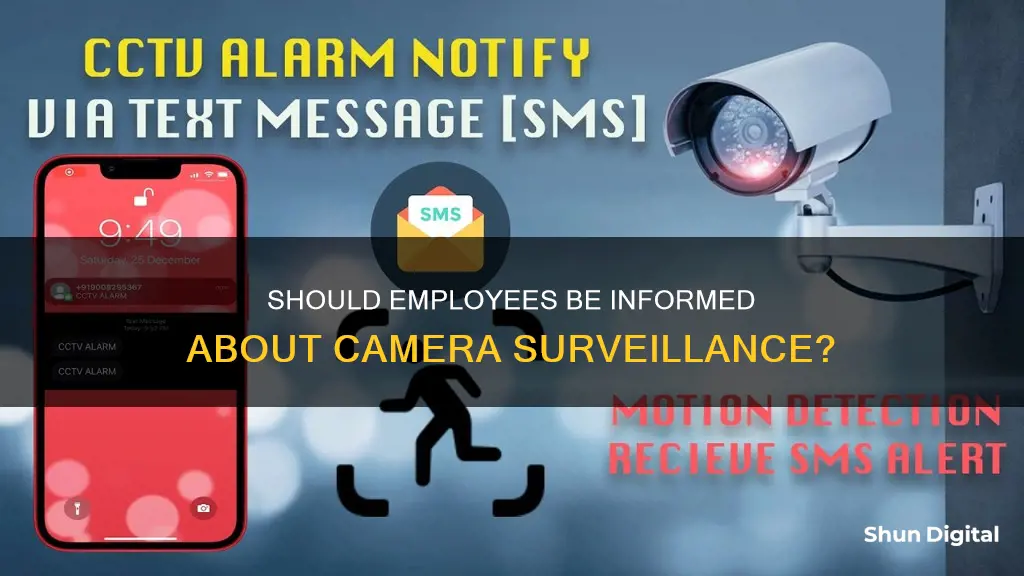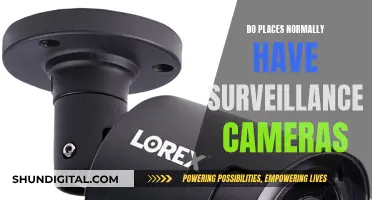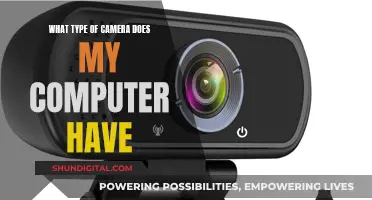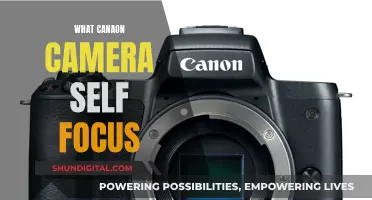
Video surveillance in the workplace is a common practice, especially in places with inventory or cash, like retail stores and financial institutions. While there is no federal law that prohibits the use of surveillance cameras in the workplace, there are limits to where employers can install them and what they can be used for. In most cases, employers must disclose their video surveillance policy to employees, including the location of all cameras, and obtain their consent. This is because filming employees can violate their right to privacy. However, employers can argue that they have a legitimate business reason for using video surveillance, such as preventing theft, protecting patrons, and monitoring employee productivity.
| Characteristics | Values |
|---|---|
| Legality of video surveillance | Depends on state law and images being captured |
| Legitimate business reasons | Security reasons, time and motion studies, investigative processes, preventing theft, monitoring employee productivity, etc. |
| Notification of employees | In most cases, employers must disclose their video surveillance policy to employees, including the location of all security cameras |
| Notification of customers | Not always necessary, but businesses must respect “reasonable expectations of privacy” |
| Use of hidden cameras | Considered a violation of workplace privacy law in almost all circumstances |
| Surveillance of union activity | Prohibited by the National Labor Relations Act (NLRA) |
| Surveillance in private areas | Prohibited in areas such as restrooms, locker rooms, and employee lounges |
| Audio surveillance | Stricter laws apply; consent of recorded parties is required in most cases |
What You'll Learn
- Employers must disclose their video surveillance policy to employees, including the location of all cameras
- Employees can exercise their right to sue if they feel surveillance cameras invade their privacy
- Surveillance is prohibited in areas where there is a reasonable expectation of privacy, such as locker rooms and bathrooms
- Employers must have a legitimate business reason for using video cameras to record employees
- Employers must notify employees if they are using any cameras in the workplace

Employers must disclose their video surveillance policy to employees, including the location of all cameras
Video surveillance is common in many workplaces, especially those with inventory or cash, like financial institutions and retail stores. Companies monitor their employees for various reasons, such as preventing theft, harassment, and vandalism, and to protect proprietary information.
However, employers must be careful not to violate their employees' privacy rights. In general, employees have a reasonable expectation of privacy in certain areas, such as restrooms, locker rooms, and employee lounges. Employers should also be transparent about the benefits of the video surveillance system to make employees feel more comfortable.
Additionally, employers must follow state and federal laws regarding video surveillance. For example, in California, it is illegal to install a one-way mirror in any restroom or locker room. In Connecticut, employers may not conduct video surveillance in areas designated for employee rest or comfort.
Overall, while video surveillance can be a useful tool for employers, it is essential to respect the privacy rights of employees and follow all applicable laws and regulations.
AI Camera Focus: Revolutionizing Photography with Intelligence
You may want to see also

Employees can exercise their right to sue if they feel surveillance cameras invade their privacy
The use of surveillance cameras in the workplace raises important privacy concerns for employees. While employers often use video surveillance to prevent theft, ensure security, and monitor employee activities, they must balance these interests with their employees' right to privacy. In most cases, employers are required to notify employees about the presence of security cameras and obtain their consent.
Employees have a reasonable expectation of privacy in certain areas and situations. For example, bathrooms, changing rooms, and private bedrooms are generally considered off-limits for surveillance cameras. If an employer installs cameras in these areas, it may constitute an invasion of privacy, and employees may have grounds to sue.
Invasion of privacy claims are typically covered by state tort law, or personal injury law. To establish an invasion of privacy claim, employees must generally show that the invasion was one that a "reasonable person" would not expect and that it resulted in highly offensive intrusion, long-term distress, or other negative consequences. For example, if an employer installed hidden cameras in a locker room and regularly viewed the footage, this would likely constitute an invasion of privacy.
In addition to state laws, federal laws such as the Electronic Communications Privacy Act (ECPA) also protect employee privacy. The ECPA prohibits employers from intercepting employees' personal telephone conversations or voicemail messages, whether on a work phone or personal device.
If employees believe that their privacy has been invaded due to the presence of surveillance cameras, they can take legal action against their employer. They should consult with an experienced employment law attorney to understand their rights and the specific laws applicable to their situation.
Are PTZ Cameras Electrically Charged?
You may want to see also

Surveillance is prohibited in areas where there is a reasonable expectation of privacy, such as locker rooms and bathrooms
Surveillance in areas where there is an expectation of privacy is prohibited. This includes bathrooms and locker rooms, as well as other areas where individuals would ordinarily expect a reasonable degree of privacy, such as changing rooms, hotel rooms, and bedrooms.
In the United States, citizens are guaranteed a reasonable expectation of privacy, which extends to video recording. This means that it is unlawful to record people in places that are typically considered private, such as bathrooms.
State laws vary, with some states having stricter laws governing the use of surveillance cameras. For example, in Connecticut, employers are prohibited from operating surveillance equipment in areas designated for employee rest or comfort, including locker rooms and restrooms. Similarly, in California, it is illegal to install a surveillance mirror in a restroom, shower, fitting room, or locker room.
To comply with privacy laws, businesses should avoid installing cameras in areas where individuals have a reasonable expectation of privacy. Instead, cameras should be placed in public and shared areas where individuals do not expect privacy, such as entrances, exits, and public hallways.
In addition to legal compliance, providing notice of video surveillance to employees and customers is considered a best practice, even when it is not explicitly required by law. This helps to remove any expectation of privacy and allows individuals to make informed decisions.
Best Cameras Compatible with the AZ16-1 Battery
You may want to see also

Employers must have a legitimate business reason for using video cameras to record employees
The use of video cameras to monitor employees is a common practice among employers, but it must be done within legal boundaries. While there is no federal law specifically prohibiting the practice, state privacy laws and federal laws dictate which surveillance systems are lawful.
Business owners must have a legitimate business reason for using video cameras to record employees. The following are some legitimate reasons an employer may claim:
- Reducing the risk of theft
- Protecting patrons from security threats
- Preventing harassment, assaults, and batteries on company premises
- Capturing video recordings of accidents and other incidents
- Monitoring employee productivity
In addition to having a legitimate reason, employers must also notify employees about the use of video surveillance and obtain their consent. This notification is usually provided in the employee handbook or through written disclosure with employees' written confirmation.
It is important to note that employers cannot place cameras in areas where employees have a reasonable expectation of privacy, such as restrooms, locker rooms, or employee lounges. Failure to comply with these regulations may result in legal consequences and violations of employees' privacy rights.
Troubleshooting Guide: Camera Won't Charge?
You may want to see also

Employers must notify employees if they are using any cameras in the workplace
Employers must inform their employees if they are using any cameras in the workplace. This is a legal requirement in most cases and is considered a best practice for respecting employee privacy rights. While there is no federal law in the US that specifically prohibits the use of surveillance cameras in the workplace, state laws and privacy rights come into play.
Location, location, location
The location of the cameras is a significant factor in determining whether notification is necessary. In the US, there are no federal laws prohibiting video surveillance in public areas of the workplace. However, some states have stricter laws regarding hidden surveillance cameras, and in certain areas, such as dressing rooms, bathrooms, hotel rooms, and locker rooms, security cameras are illegal.
State laws
State laws vary, with some states explicitly addressing video surveillance. For example, California, Connecticut, Delaware, and New York prohibit video or audio surveillance in certain workplace areas, such as restrooms or break rooms. Connecticut also requires employers to notify employees if they are using any cameras in the workplace.
Best practices
It is highly recommended to provide notification of video surveillance in writing and to obtain written confirmation of employees' understanding and consent to be recorded. Most employers disclose the presence of security cameras in an employee handbook. Making security cameras visible is also a recommended practice.
Employee privacy rights
Employees have a reasonable expectation of privacy in certain areas and situations, such as using the restroom or changing clothes. In these cases, employers generally do not have a substantial enough need to justify filming.
Legitimate business purposes
Employers must have a legitimate business reason for using video cameras to record employees. Legitimate purposes may include reducing the risk of theft, protecting patrons and employees from security threats, preventing harassment, assaults, and batteries on company premises, and capturing video recordings of accidents and incidents.
In summary, employers must notify employees if they are using any cameras in the workplace, with specific requirements and best practices varying by state. This notification is crucial for respecting employee privacy rights and ensuring that any filming is justified and lawful.
Belkin Camera Battery Charging: A Step-by-Step Guide
You may want to see also
Frequently asked questions
In almost all cases, yes. Employers must disclose their video surveillance policy to employees, including the location of all security cameras. This is usually done in writing, with employees signing a form to confirm their consent.
Some courts have found the use of hidden cameras in the workplace legal in highly specific circumstances, but these are rare. In general, employers should disclose all security cameras to employees.
If you feel your privacy rights have been violated, you can contact your state department of labour or an employment attorney licensed in your state.







